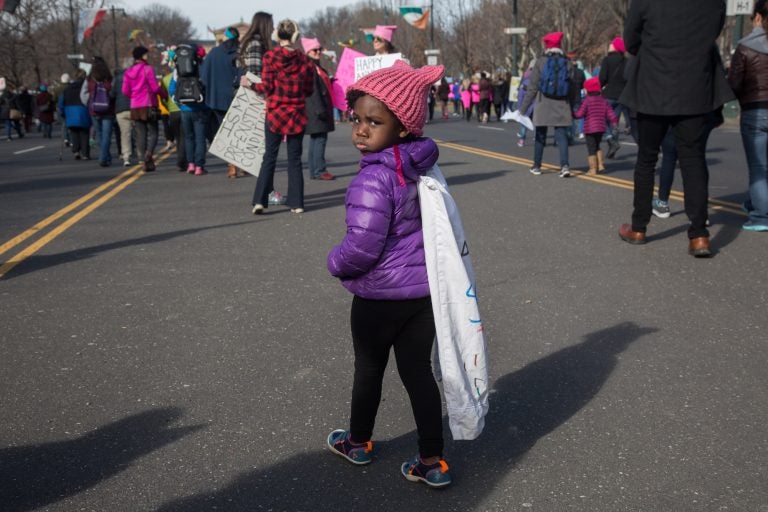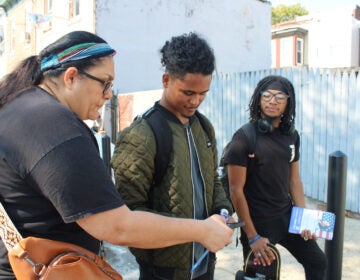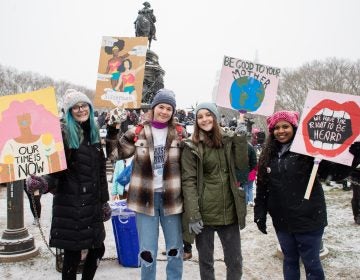The world won’t change until women of privilege make room for all women
It’s one thing to stand for inclusivity and racial justice; it’s something else to walk those values every day.

Lotte Snyder, 3, shows off her cape at the 2018 Women's March on Philadelphia, January 20, 2018. (Emily Cohen for WHYY)
We managed to find parking in Fairmount last Saturday, and I’d rummaged the pussy hats from under a year’s accrual of mittens and scarves. As we joined the crowd in front of the Philadelphia Museum of Art, one of the first signs I saw — block letters inked on plain poster board — read, “You’re so vain. You probably think this march is about you.”
Last year, it was about him — at least, that’s how it felt, coming one day after Donald Trump smirked his way through the oath of office to become president.
The 2017 marches were a rose-colored rebuke heard round the world, as women and men, children and adults, newbies and long-seasoned protesters massed in Los Angeles and London, Nairobi and Kolkata, Antarctica and Mexico City. A repudiation of the pussy-grabber-in-chief and all he stood for: intolerance, self-absorption, misogyny, racism, greed.
I couldn’t bear to watch the inauguration. But I was game to march down the Ben Franklin Parkway with my partner, our housemates, and 50,000 compatriots, boosting a 6-foot banner that read, “Yes, we can! And no, you can’t grab my pussy!” with an updated image of Rosie the Riveter, bicep fiercely flexed.
We were angry, we were ebullient. It felt, for a few hours, like the start of a revolution — or, at least, the next wave in a long, attenuated tide toward justice. And then it was the next day, and the day after that, a Monday: the start of a weird and alarming new American order.
What next?
So what happened, after the crowds dispersed and our banner was tucked in a corner of my office? What came of that day’s grand vows: to battle racism and homophobia; to agitate for immigration rights, equal pay, and access to health care; to call out and dismantle sexual violence?
We hit the phones: in 2017, 86 percent of calls to Congress were made by women.
We ran for office, and we won: Charlotte, North Carolina, elected a black woman to the mayor’s office for the first time. Democrat Danica Roem became Virginia’s first transgender lawmaker. Latina mayors in Topeka and Santa Barbara. An African-American woman as the new mayor of Milledgeville, a town of 18,000 whose website touts it as “the first lady of Georgia … bathed in an intoxicating mixture of magnolia and moonlight.”
But amidst those electoral triumphs were rumblings of dissension, challenges directed not at the new occupant of the White House, but at women ourselves.
It started moments after the pink-hatted crowds cleared from the Washington Mall, as marchers and police officers there and elsewhere were congratulating themselves on largely peaceful protests. “White women and white bodies can hold space on streets and shut down cities ‘peacefully’ because they are allowed to,” wrote blogger and author Luvvie Ajayi in a Facebook post that was shared more than 6,000 times. “Black and brown people who march are assaulted by cops.”
It was a blunt poke: Don’t bask in the magnolias and moonlight. Don’t call those barrier-breaking elections the harbingers of a “post-racial” society. Ajayi’s words reminded us that some women are seen, still, as less equal than others.
In June, the Institute for Women’s Policy Research issued a report on the status of black women in the United States. It was sober news:
- Black women are underrepresented at every level of state and federal politics.
- Black women experience intimate partner violence at higher rates than women overall.
- Black women of all ages were twice as likely to be imprisoned as white women in 2014.
- And — to me, one of the most heartbreaking statistics — black girls are disciplined at higher rates than any other group of girls in public schools.
So vain?
It’s one thing to stand for inclusivity and racial justice; it’s something else to walk those values every day. In October, I spoke, along with my teenage daughter, on a panel at the Philadelphia Family Pride conference. The topic: finding the half-siblings of donor-conceived children through the online Donor Sibling Registry.
I was so tickled to join the conference, so happy to share my experience alongside my kid, that I didn’t notice all six panelists were white — or clock that as a problem — until a woman of color in the audience pointed it out.
When I say “women,” when I cozy into that “we,” am I picturing a Latina hotel maid without papers, petrified each day that this will be the day ICE shows up outside the Marriott? Am I thinking of a woman imprisoned for striking back at her abusive partner? Or a trans woman jeered as she walks down a city street?
Or am I envisioning women like the women I know — middle-class, educated, U.S.-born artists and teachers, social workers and physicians, women for whom a certain amount of access is the air we breathe, the skin we wear, the privilege we too often forget.
What we’ve learned this year is that Trump is not the enemy. At least, he’s not the only enemy. There’s a list, growing longer by the week: Harvey Weinstein; conductor Charles Dutoit; chef and restaurant owner Mario Batali; federal appeals court judge Alex Kozinski; writers and actors and politicians and talk-show hosts.
If every Weinstein were sent packing from his cushy job, the problems of sexual harassment, assault and rape — men’s entitlement, women’s objectification — would still be pandemic. If Trump were impeached tomorrow, women the world over — especially poor women, queer women, elderly women, women of color — would still have reason to march.
Portland, Oregon, where I lived for 10 years, has a new police chief. An African-American woman. She stands 5-foot-4 and sports a tattoo on her left arm, a quotation from “A Midsummer Night’s Dream.” It says, “Though she be but little, she is fierce.”
I smiled when I learned that; it’s the same quotation we put on our daughter’s birth announcement 17 years ago. That daughter will leave home soon, poised for college and whatever comes next. What I want for her, I must want for every girl-child: a life of safety and meaning and liberation and love.
Maybe that sign I saw — “You probably think this march is about you” — wasn’t aimed at Trump, after all. Maybe it was for me, a reminder that the world won’t change until those of us with power, born or earned, are willing to share it, surrender it and use it, fiercely, on behalf of all women, everywhere.
WHYY is your source for fact-based, in-depth journalism and information. As a nonprofit organization, we rely on financial support from readers like you. Please give today.




